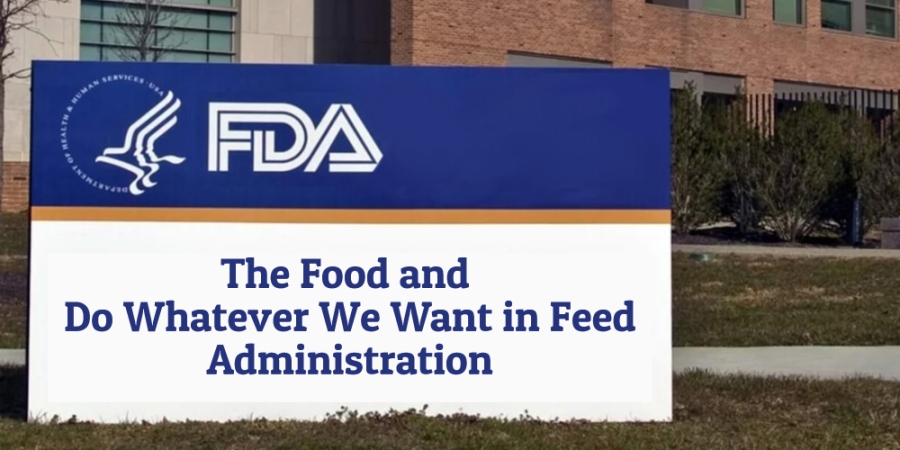Dr. David Dzanis is a board certified veterinary nutritionist, former FDA veterinarian, and a consultant to the pet food industry. He participates in AAFCO meetings and is well respected for his knowledge of the pet food industry.
His years of knowledge and experience makes the following quotes from a post he authored in 2012 that much more significant. The quote is taken from a post regarding FDA’s partnership with AAFCO.
“The problem with this cooperative activity is that although the AAFCO process is scientifically rigorous, from FDA’s perspective it is based on enforcement discretion—i.e., not a formally sanctioned procedure for acceptance of new feed ingredients.”
“FDA was in recent years advised by counsel to forego further involvement with AAFCO on this matter and rather pursue “legal homes” for all allowed feed ingredients.”
FDA lawyers told the agency to end their involvement with AAFCO. How serious is this issue for government attorneys to advise FDA to make this change?
Background: In 2007, FDA signed an agreement with AAFCO (Memorandum of Understanding). This agreement – which is not legally binding – allowed AAFCO (Association of American Feed Control Officials) to define pet food/animal feed ingredients with participation of FDA. This agreement has been renewed every couple of years since. (Almost a full year in advance of the last renewal, we/Association for Truth in Pet Food requested a meeting with FDA regarding the agreement – FDA denied our request.)
So…Why would FDA attorneys tell the agency to get out of AAFCO?
Because what FDA does at AAFCO is not abiding by federal law.
The legal process for food ingredient definitions requires “a formally sanctioned procedure”. An example of a formally sanctioned procedure for food/pet food ingredient definitions is the GRAS process (Generally Recognized as Safe).
For GRAS approval of an ingredient, a scientific foundation for safety is required to be provided to FDA, reviewed by FDA, and notice of the pending ingredient is published in the Federal Register for public comment.
To the contrary, FDA’s participation in AAFCO is allowing pet food ingredients to be defined without scientific evidence of safety and without opportunity for public comment.
Personal experience: I’ve been attending AAFCO meetings for 11 years. Not once in those 11 years have I seen science submitted to AAFCO committees as foundation for ingredient safety. Just one example…Zinc Hydroxycloride was a feed supplement approved by AAFCO in 2017. Three veterinarians in attendance of that meeting spoke against the supplement’s approval because of the allowed levels of heavy metals within the ingredient definition (90 ppm lead, 15 ppm chromium, 10 ppm arsenic, 10 ppm cadmium). All three veterinarians were concerned with the cumulative effect of heavy metals in multiple supplements. With no scientific evidence provided, and without addressing the concerns of 3 veterinarians, AAFCO approved the feed supplement.
In a formally sanctioned procedure to approve an ingredient, FDA would have been required to address the concerns of those veterinarians. In a formally sanctioned procedure science would have been required to prove safety of the ingredient with the allowed levels of heavy metals.
But…AAFCO is not a formally sanctioned process, so none of that happened. This supplement whose definition allows it to be contaminated with 90 ppm lead – is used in animal feed today. And the same thing happens with every other pet food/animal feed ingredient. No science, no public comment, no formally sanctioned definition procedure.
What does this mean for pet owners?
It means that pet food ingredients are not legally defined. It means that scientists, veterinarians, and consumers who would like to question the safety of an ingredient – don’t have that opportunity. It means pet food ingredients are defined by a process NOTHING similar to human food ingredients.
It means the FDA was alerted more than 10 years ago by their own attorneys that the AAFCO process is not legal. It means the FDA could care less about law in pet food, they chose then and continue to choose to ignore their own legal counsel and continue to participate in the AAFCO process.
[The exception to this is human grade pet foods. One of the legal requirements for pet foods to be labeled as human grade is that the pet food is manufactured in a licensed human food facility. Being manufactured in a licensed human food facility means every single ingredient (including supplements) meets human food definitions and laws. Human food ingredients have been defined by formally sanctioned processes.]
It means that pet owners are being taken advantage of by FDA discretion even more than we thought.
Shame on you FDA.
Wishing you and your pet the best –
Susan Thixton
Pet Food Safety Advocate
TruthaboutPetFood.com
Association for Truth in Pet Food

Become a member of our pet food consumer Association. Association for Truth in Pet Food is a a stakeholder organization representing the voice of pet food consumers at AAFCO and with FDA. Your membership helps representatives attend meetings and voice consumer concerns with regulatory authorities. Click Here to learn more.
What’s in Your Pet’s Food?
Is your dog or cat eating risk ingredients? Chinese imports? Petsumer Report tells the ‘rest of the story’ on over 5,000 cat foods, dog foods, and pet treats. 30 Day Satisfaction Guarantee. Click Here to preview Petsumer Report. www.PetsumerReport.com
Find Healthy Pet Foods in Your Area Click Here

The 2022 List
Susan’s List of trusted pet foods. Click Here to learn more.



































T Allen
June 27, 2022 at 8:10 pm
Great sleuthing Susan! Looks like publicizing this info widely and trying to hit these companies in the pocketbook is the only way to protect pets. I’m not holding out hope this Gov is going to change any time soon.